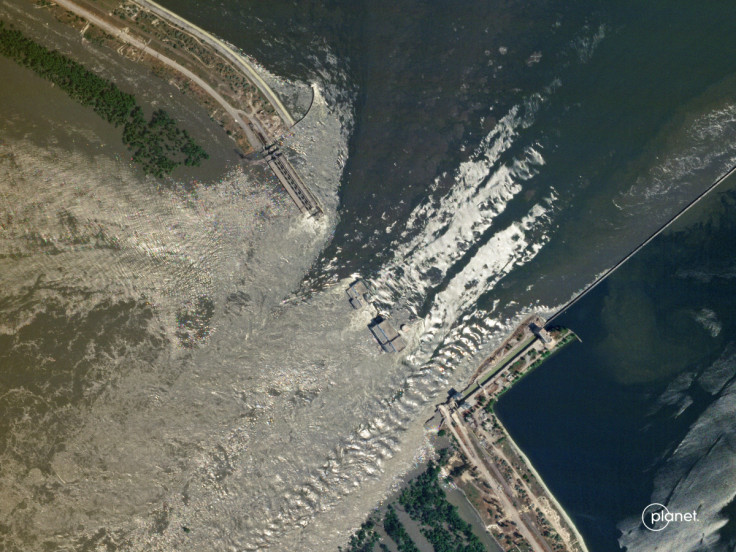Ukraine dam collapse may poison Black Sea, affect the world, claims Zelenskiy
Ukraine's president Volodymyr Zelenskiy has also claimed that 20,000 animals and 10,000 birds were "under threat of imminent death".

The collapse of Ukraine's Nova Kakhovka dam can spell disaster for the rest of the world as well, claims Ukrainian President Volodymyr Zelenskiy.
Zelenskiy claims that the flood waters from the Dnipro River valley are highly contaminated due to the presence of sewage, oil, chemicals, and possibly anthrax from animal burial sites.
The dam was built in the Soviet era along the Dnipro River, which flows into the Black Sea. Zelenskiy fears that the contaminated water will pollute the Black Sea, which can eventually become an ecological disaster, per The Guardian.
"At least two anthrax burial places are in the temporarily occupied territories," Zelenskiy told environmental activists. "What is happening to those sites we do not know yet." He has described it as an "environmental bomb of mass destruction."
NEWS UPDATE NOVA KAKHOVKA EVENING JUNE 7
— Mikael Valtersson (@MikaelValterss1) June 7, 2023
I don't know who's responsible for destruction of the Nova Kakhovka dam, but if you do what you can to worsen the situation and destroy the remnants of the dam, you're the prime suspect, not the victim. Ukraine keeps the gates at Dnipro… pic.twitter.com/WmQK2h0eZh
Ukrainian Environment Minister Ruslan Strilets said that at least 150 metric tonnes of oil from the dam has made its way to the Dnipro River.
Oil is composed of volatile compounds, which are emitted as gases when spills take place. Once in the air, contamination may travel long distances and cause a variety of problems. Breathing the vapours can affect the nervous system, which could lead to headaches, nausea, and dizziness, as well as cause respiratory irritation.
It could even cause skin problems if used for bathing purposes. Also, if a large amount of oil enters a body of water that is used for consumption, it could affect the nervous system, blood, and kidneys of people drinking that water.
Zelenskiy claims that 20,000 animals and 10,000 birds were "under threat of imminent death."
"The poisoning and contamination coming from the flooding area goes to the groundwater almost immediately, poisoning rivers and then the water basin of the Black Sea," he said. "So it's not happening somewhere else. It is all interrelated in the world," he added.
The dam was located in the city of Nova Kakhovka in the Kherson region, which is currently under Russian occupation. It used to supply water to communities upstream and provide cooling water to the nuclear power station at Zaporizhzhia. It was also an important source of water for Russian-occupied Crimea.
What happened?
According to local media reports, the dam was destroyed early Tuesday, forcing thousands of Ukrainian citizens to flee their homes. The footage from the incident shows a breach in the dam and its waters flooding Kherson.
Dozens of villages, agricultural land, and towns have been flooded. Thousands of people have been evacuated, and thousands more are being evacuated. The consequences of the flooding and the dam breach will be felt for years to come.
The #Kherson region before & after #Russia blew up the #Kakhovka dam. They do this to our cities and villages — the catastrophic flood in the south of #Ukraine will change this region and its nature forever.#RussiaIsATerroristState pic.twitter.com/xFF5NhFfCb
— MFA of Ukraine 🇺🇦 (@MFA_Ukraine) June 8, 2023
Russia and Ukraine have accused each other of destroying the dam, however, neither of them has shown any evidence to support their respective claims. Several theories have also cropped up about what may have caused the damage to the dam.
Ukraine has launched an investigation into the matter and is treating the incident as a war crime, according to a statement from Ukraine's Prosecutor General, Andrii Kosti.
"Ukraine has initiated proceedings over this crime, qualifying it as a violation of the laws and customs of war and ecocide. It has caused severe long-term damage to people and the environment," read the statement from Kostin.
"The consequences are catastrophic. More than 40,000 people have been affected. Homes and infrastructure have been destroyed, land has become unsuitable for agriculture, and water supply has been disrupted in a number of regions, both in the government-controlled areas and in the territories temporarily occupied by Russia," it added.
Some experts believe that more than a year of fighting and bombing could have affected the structure. "Structural failure resulting from the impact of earlier damage associated with the war remains a possibility," Mark Mulligan, professor of Physical Geography at University College London, told the BBC.
© Copyright IBTimes 2025. All rights reserved.






















